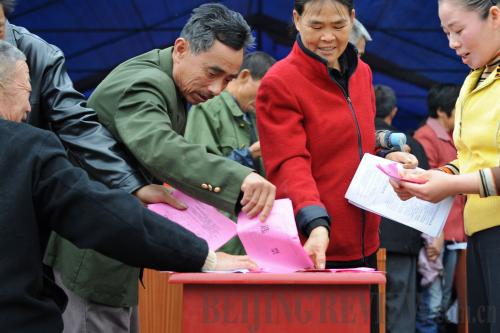|
 |
|
HAVING THEIR SAY: Villagers in Hubei Province's Jitoushan Village vote for local villagers' committee in November 2008 (CAO LIDA) |
The National People's Congress (NPC) Standing Committee is now reviewing the success of a 10-year-old village management law that allows locals to organize their own government.
The draft amendments to the Organic Law of Villagers' Committees, which affect 900 million rural residents, underwent its first review at a bimonthly session of China's top legislature, which ended on December 26, 2009. The changes would focus on elections and recall procedures for villagers' committee members.
The Organic Law of Villagers' Committees, which was enacted in 1988, was originally tested in pilot rural areas. In 1998, it took effect across the country "to ensure self-government by rural villagers who administer their own affairs in accordance with the law, promote socialist democracy at the grassroots level, socialist material development and build an advanced socialist culture and ideology in rural areas," the law states.
The law allows for the creation of villagers' committees, which are the "primary mass organization of self-government, in which villagers manage their own affairs, educate themselves and serve their own needs," according to the law.
Lawmakers said the law has played an important role in promoting rural democratic elections and local decision-making, management and supervision since it took effect, Xinhua News Agency reported.
China contains more than 2 million villages and 604,000 villagers' committees, of which more than 95 percent have held direct elections. Many of the committees that have been operational since the 1988 pilot project have conducted more than seven elections.
A Ministry of Civil Affairs report submitted to the top legislature said election run of village candidates has grown ever fiercer over the years, and participants often make enthusiastic campaign speeches.
But Minister of Civil Affairs Li Xueju told lawmakers that rural development, especially the reform of the rural and urban household and taxation system, has caused new problems to emerge in village governance.
The draft amendments allowed villager representatives to convene meetings to decide upon community affairs in villages with large and scattered populations.
More and more villagers have left home to find work in cities, which has made it difficult to hold elections. Wang Jinhua, a Ministry of Civil Affairs official, said the migrant population has soared to 150 million and increases annually by 5 million.
"This number represents the largest floating population in the world; it is more than the total population of many countries," Wang said.
Even when some return, the number of voters often fails to meet the minimum requirements to make the campaign legitimate.
New amendments look to ensure the rights of migrant workers by allowing them to participate in elections by casting their vote by phone or other remote means.
One of the proposed changes would also lower the requirements to remove village committee members. It would require at least a fifth of the village electorate or at least a third of village representatives to sign a petition to remove committee members.
The draft requires that the village electoral committee chair the removal process. As the law now stands, the village committee itself is allowed to preside over recall procedures. Candidates who menace others, cheat, offer bribes, falsify ballots or use violence would face administrative or legal punishment.
The draft also proposes that supervisory agencies make village financial accounts and other affairs more transparent, while also extending the original 30 articles of the law to six chapters and 39 articles.
The public is invited to comment on draft revisions by either submitting them online at the NPC website, www.npc.gov.cn, or mailing them to the Commission of Legislative Affairs of the NPC Standing Committee. The deadline for public submissions is January 31, 2010. As of January 5, 2010, more than 2,000 people had submitted their comments through the website. | 